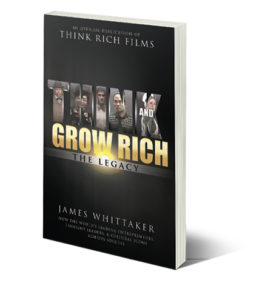“For things to change for you, you have to change.”
“Again!?” I muttered at Dad, as the iconic voice of personal development legend Jim Rohn burst through the speakers.
I closed my 10-year-old eyes to briefly imagine a different reality. Pretending to instead be getting a lift in a friend’s car, I pictured us tuned into one of the popular radio stations in our hometown of Brisbane, Australia, blaring chart-topping hits while we all sang in unison, led by the ‘cool dad’ in the driver’s seat.
The bland white Volvo 740 sedan pulled up at my school. My brother and I unbuckled our seatbelts, grabbed our things and stepped out of the car while Rohn’s uncanny one-liners continued in the background:
“Don’t wish it was easier. Wish you were better.”
“Work harder on yourself than you do on your job.”
“Don’t wish for less problems. Wish for more skills.”
Related: 15 Personal Development Quotes to Help You Invest in Yourself
Retrieving our black backpacks from the trunk, we started the short uphill walk to the school.
“Have a great day!” our boring dad chirped. He hadn’t said much on the drive, instead choosing to focus on the road and the cassette; then again, perhaps that was a response in itself.
“Thanks for the lift,” I responded lethargically.
I thought about my dad’s positive attitude and wondered how one person could be so happy all of the time. Maybe I had been switched at birth and there was a jovial kid up the road excitedly skipping to school.
***
In the next few years, disillusionment about my place in the world (which included being unable to obtain an entry-level job at McDonald’s) gave way to a crippling anxiety disorder. The debilitating feelings emerged whenever my brain decided I was in a situation that I could not escape from, often triggered by being in a classroom or sitting for an exam. If I was unable to remove myself from the environment, I would feel extreme sensations of dizziness and then either faint, throw up or both.
Related: 7 Distorted Thinking Patterns That Contribute to Anxiety
Scraping into university by the slimmest of margins, I knew that college would require me to regularly attend class and take exams. Fortunately, I discovered the perfect short-term solution: I could get through it if I simply decided not to care.
Mediocre attendance and mediocre study led to mediocre results, including a few failed subjects, but I was progressing, albeit at a snail’s pace.
Through my dysfunctional university stint, I’d miraculously been able to hold a part-time job at a liquor store; it was even fun a lot of the time because I enjoyed the job, the paycheck and the people I worked with. Then one day I was confronted with one of the moments that I dreaded most. I was scheduled to work one Sunday morning, alone. I was sure the inescapable situation would trigger the feelings, potentially worse than ever, and as the date approached I had all but convinced myself it was the perfect storm.
Sunday morning, I approached the store and nervously jiggled the lock open. I acted as if it were just a normal shift, stocking the wines on the floor and filling the refrigerators with beer and pre-mixed beverages. Impossible to ignore, I took a brief moment to peer at my watch and see how long had elapsed: 14 minutes.
You could set your clock to the condition, and at times I literally did. Around 22 minutes was the absolute danger zone. If I could just get to 30 minutes, I knew everything would be fine. While my watch ticked ever so slowly, I tried to block out the ping-pong battle of embarrassing memories and extreme “what ifs” that raced through my head: “What if I can’t work—how will I live? What if I collapse and hit my head and die? What if a customer comes in and robs the place?”
I leaned against the counter and stared at my watch, begging the feelings to stay dormant, to get me past 30 minutes. To give me my life back.
Then, the familiar sensations emerged.
Bright lights, like fiery balloons, occupied my field of vision, and I felt them lash my skin. As my body sank, I made a last-ditch effort to hurl at the direction of the trash can before losing consciousness.
However long later, I groggily sat on a stool and felt prickly shivers run through my whole body while staring at the mess on the floor. I had tried to fight but lost yet again. I phoned the store manager—a wonderful guy—to see if he could take over the shift. Embarrassingly, it was his only day off and he had to leave his young family to come in.
Driving home in disgrace, I was inconsolable. Being unable to study was bad enough, but having it take over my work prospects was the final straw. I loathed my defunct body and paralytic mind that was unable to fulfill the most basic of human tasks.
Hearing me return home hours ahead of schedule, and observing the shell of a son in front of her, my mom could tell something was seriously wrong. A homemaker most of her life, she had made the decision to attend university as a mature age student where she graduated with a psychology degree. She then went on to forge a meaningful career helping children who had been sexually abused.
I couldn’t hold it in any longer. During our heated conversation, I erupted in a haze of tears (and colorful language that no one should use with their mom): “I can’t do this anymore. What kind of life is this?”

My wish was simple: I wanted to be normal. There it was—the total sum of my desires—to be just like everybody else.
As she calmed me down, she looked me dead in the eyes and said, “James, you have everything you need right here and right here.” She gently tapped my head and my heart. “You’re much stronger than you could ever know.”
***
The proudest moment of my career occurred this past October when I was invited back to my high school in Australia, 18 years after graduating, to speak to the students on success, mindset and resilience. It’s funny how life
turns out.
Before the liquor store incident, I had aimlessly wandered through life accepting whatever fate handed me and dancing to the beat of a demon I didn’t think could be exorcised. Finally, at rock bottom and out of sheer desperation, a single conversation had completely shifted my mindset and planted a seed of hope. It led to a resolute decision that, until my dying breath, I would take complete ownership of my life and would help as many people as I could along the way to do the same.
In the immediate aftermath of that fateful day, I devoured everything I could find on self-improvement, positive psychology and peak performance. Every page elevated my belief in what was possible and forged another layer of unwavering confidence. The student was ready, and masters were
everywhere.
My continual pursuit of growth and knowledge led me to Think and Grow Rich, which became the most life-changing book I ever read. As the godfather of the entire personal development field, the book’s author Napoleon Hill provided the blueprint for the most renowned people of the last century to achieve greatness. His timeless achievement philosophy packaged the principles of success into a readily digestible formula that could be applied by anyone, irrespective of background or circumstance, to achieve whatever they desire. Hill also reminds us that thoughts are meaningless unless they’re reinforced with sustained, purposeful action.
Hill teaches us that our biggest adversities can spur us on to greater success than we could ever imagine, if we simply follow his blueprint. There are testimonials for his brilliance all over the world, and I feel privileged to have been privy to some firsthand anecdotes through the process of writing my new book, Think and Grow Rich: The Legacy, the official companion piece to a multimillion-dollar film based on Hill’s original classic.
What do I owe Napoleon Hill? Everything. What I learned from Hill and the people he inspired—among them Jim Rohn, whose audio programs I still listen to regularly—enabled me to offset 23 years of limiting beliefs and start living on my own terms. His teachings have inspired people in every industry to pursue happiness, honesty and harmony for the greater good of humanity.
The legacy of Napoleon Hill is just getting started, as his wisdom continues to transform lives almost 50 years after his passing. Hill, and those who carry the personal growth torch today, remind us that—in our short time on Earth—the greatest gift we can give is the ongoing pursuit of our potential so that we may inspire others to do the same.
I think about the younger me, the kid who couldn’t even get an entry-level job at McDonald’s, and smile. Of one thing I am sure: On the journey to success, when adversity inevitably strikes, how you respond to it is what separates ordinary people from extraordinary achievers.
In April, my wife and I are expecting our first child—a girl. I can’t wait to drive her crazy on the way to school with the voices of Napoleon Hill and my other favorites blaring through the speakers.
Related: Napoleon Hill’s 17 Principles of Personal Achievement

James Whittaker’s latest book Think and Grow Rich: The Legacy is out now.
This article originally appeared in the Summer 2019 issue of SUCCESS magazine.



